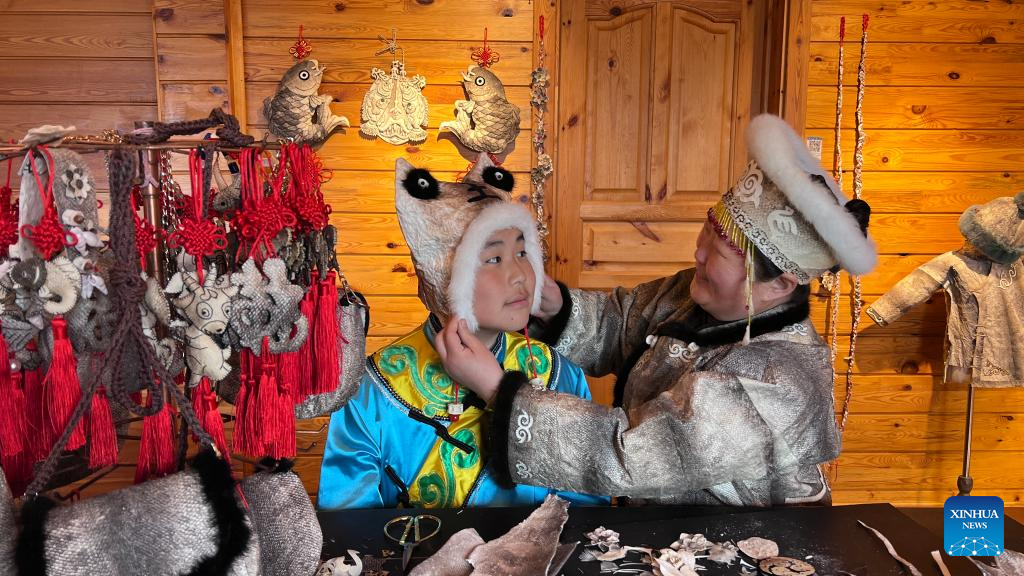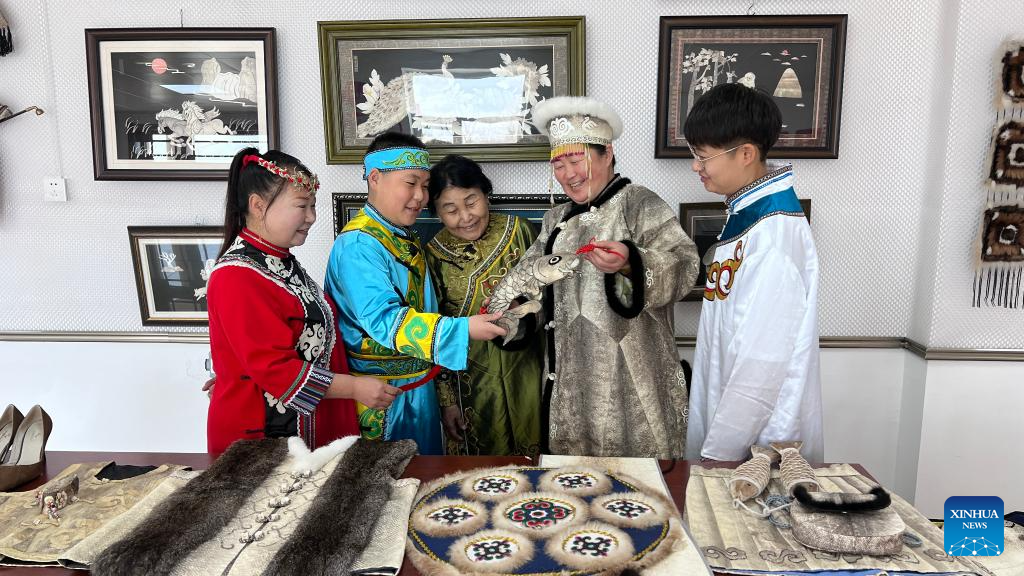
This photo taken with a mobile phone shows You Minghao's grandmother helping him wear a traditional fish-skin hat at a handicraft workshop in Bacha Village of Tongjiang City, northeast China's Heilongjiang Province, April 19, 2023. (Xinhua/Zhang Yue)
HARBIN, June 1 (Xinhua) -- "The brave and hard-working Hezhe people. In the Three-river Plain, we live and prosper..."
Every time You Minghao, 12, performs the mesmerizing Hezhe ballad "Wusuli River," it stirs memories of the rainy afternoon when his village warmly welcomed a special guest, Chinese President Xi Jinping.
In May 2016, during an inspection tour in northeast China's Heilongjiang Province, Xi, also general secretary of the Communist Party of China Central Committee and chairman of the Central Military Commission, went to Bacha village in the city of Tongjiang.
There, Xi watched an exhibition on folk customs and a class on Yimakan storytelling.
Together with other villagers, You, who was 5 years old then, performed the Hezhe folk song "Wusuli River" before Xi.
Xi commended the Hezhe ethnic group for their long, enduring history and rich culture, particularly their remarkable expertise in fishing and hunting, exquisite pattern art, and the lasting appeal of Yimakan storytelling.
"I felt a bit nervous and worried about singing off-key," You recalled, reminiscing about that day. However, he went on to add that this experience instilled a deep sense of pride in his own ethnic identity.
As one of China's smallest ethnic minority groups, Hezhe people live mainly in the areas around the Heilongjiang, Songhua and Wusuli rivers.
In recent decades, rapid advancements in their financial status and improvements in health care have led to remarkable population growth. The Hezhe population surged from just over 300 to more than 5,300.
You learned "Wusuli River" from his grandmother You Wenlan. The 78-year-old woman was born in Bacha Village, one of the main settlements of the Hezhe ethnic group.
"In the past, we lacked clothes and food. Now everything has changed for good...," read the lyrics of the song.
For You Wenlan, "Wusuli River" serves as a powerful medium to convey the profound life transformations experienced by the Hezhe people.
"We once lived in straw houses and underground caves. They have been replaced by villas, while the dirt roads have been upgraded to smooth asphalt roads," she said.
Bacha is one of more than 1,600 "villages with unique ethnic features" in China. It is home to over 500 residents. The locals sustain their livelihood through soybean cultivation and fishing, while also harnessing the unique ethnic characteristics of the village to foster the development of tourism.
"In recent years, China has attached great importance to preserving and passing down ethnic cultures," said You Wenlan, a provincial-level inheritor of Yimakan.
Yimakan storytelling is an oral art in the form of singing and speaking that has been transmitted from generation to generation by the Hezhe people, who solely possess a spoken dialect without a written form.
With the transformation of their way of life, Yimakan gradually lost its prominence. However, its significance was recognized through its inclusion on the national intangible cultural heritage list and its inscription on the UNESCO List of Intangible Cultural Heritage in Need of Urgent Safeguarding.
According to official data, there are six centers dedicated to the study and practice of Yimakan storytelling in Heilongjiang, with participants ranging from elderly people to primary school students like You Minghao.
Recently, the boy has become a county-level representative inheritor of Yimakan, fulfilling a long-held dream of promoting Hezhe culture on bigger stages.
In order to preserve the Hezhe culture and ensure it is passed down to future generations, You's school -- No. 4 Primary School of Tongjiang -- has started courses focused on Hezhe culture, including activities such as fish-skin ornament making.
The local Hezhe ethnic culture is also spreading beyond its place of origin and gaining influence outside.
In 2016, You and his grandmother came to Beijing for a televised national folk song contest. They performed his favorite song "Wusuli River," which is tied to their memories and past experiences.
"I hope more people can learn about the Hezhe ethnic group and understand our history and culture. I, too, am committed to deepening my own knowledge," said You, who is preparing folk songs to perform at an upcoming Hezhe traditional festival. ■

This photo taken with a mobile phone shows You Minghao (2nd L) looking at a fish-skin ornament at Bacha Village in Tongjiang City, northeast China's Heilongjiang Province, April 19, 2023. (Xinhua/Zhang Yue)



